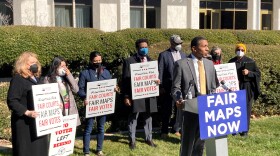This summer President Obama appointed former North Carolina Supreme Court Justice Patricia Timmons-Goodson to the U.S. Commission on Civil Rights. The Commission, an eight member panel, is charged with developing federal civil rights policy.
Timmons-Goodson was the first African American female appointed to the North Carolina Supreme Court. She spoke with Phoebe Judge about the shooting of unarmed teenager Michael Brown and changes in North Carolina's voting rights laws, among other topics.
(Timmons-Goodson notes that these comments are her personal opinions and not those of the commission.)
On Michael Brown, the unarmed African American teenager who was shot by a police officer in Ferguson, Missouri:
I found myself thinking 'What is going on in this country when African American parents, regardless of their socioeconomic class must have a conversation with their young sons -- conversations about what they must do to protect themselves?'
'As I watch all of this unfold, I find myself wondering whether my husband and I have done enough talking to our sons to protect them.'
Because many of these parents understand that when their sons encounter law enforcement, they are not going to see that family background. They are not going to see how much love went into rearing them. They are going to see a black male.
And too many [law eforcement officers] are willing to accept the stereotypes that they see.
And so as I watch all of this unfold, I find myself wondering whether my husband and I have done enough talking to our sons to protect them.
I find myself thinking that there's some real issues here. And we've got to get to the bottom of it.
On the relevance today of the Civil Rights Commission, which was initially formed in 1957 at the height of civil rights divide in the U.S.:
First let me say I am grateful for the progress that this country has made in both race relations and on the civil rights front. But one would have to be blind not to see that there remains a tremendous amount of work to be done.
On her childhood in the South:
(Timmons-Goodson's father, a sergeant in the U.S. Army, was among the first to serve in Vietnam. Previously, the family had lived in Germany, and in other U.S. locations. In 1965 they settled in Florence, South Carolina.)
Two things stand out in my mind. The first one is the fact that I learned that I could go to the movies with my allowance and come off paying less to see the same movie if I was willing to sit in the balcony. ... I can pay less? And throw popcorn? I'm game.
The other thing, on a serious note, that stands out in my mind is that my 6th grade teacher (that was the grade I began at the integrated elementary school) had never taught a student of color. And I've always been a strong student, thank goodness. And at the end of the 6th grade, I was disappointed to learn that I was not going to be placed in advanced classes with the other students that I regularly competed with and held my own.
And to this day I remember that.
On the implementation of voting rights laws which have been called some of the strictest in the nation:
(One of the new restrictions will require voters to show ID at the polls. Critics argue this will have negative consequences for young and minority voters and are calling this a civil rights issue. )
'I believe any action taken which affects voting rights should be given the greatest amount of scrutiny possible, and that there should be little tolerance for any action that is going to negatively affect voting by our citizens.'
With regard to your question about whether voting right is a civil right, I don't think there's any question that it is.
And I believe any action taken which affects voting rights should be given the greatest amount of scrutiny possible, and that there should be little tolerance for any action that is going to negatively affect voting by our citizens.
On her hopes for civil rights and the future of the country:
For any kind of progress to be made, there must be an acknowledgement that works needs to be done. So my first hope is that there will be an embrace by our citizens that 'We've got some problems here.' And I hope that we will face them head on. That we will be honest in the assessments...
And then I pray that we will have the strength and the courage to engage in whatever actions are necessary to come to a respect for others, and for the differences of others, and an acknowledgement that this country belongs to all of us, and not just those who look like the earliest settlers.









